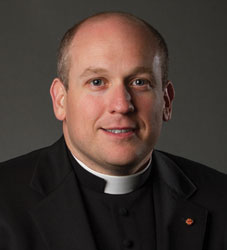 When asked about images or personifications of God, many people name the image of the Good Shepherd. It is an image that is familiar to Christians, both Catholic and non-Catholic alike. The image created by Psalm 23 serves as a basis for this and, for Catholics, every year on the Fourth Sunday of Easter, the Gospel speaks of Jesus as the Good Shepherd. The regularity of this image during this season has resulted in this Sunday being nicknamed “Good Shepherd Sunday.”
When asked about images or personifications of God, many people name the image of the Good Shepherd. It is an image that is familiar to Christians, both Catholic and non-Catholic alike. The image created by Psalm 23 serves as a basis for this and, for Catholics, every year on the Fourth Sunday of Easter, the Gospel speaks of Jesus as the Good Shepherd. The regularity of this image during this season has resulted in this Sunday being nicknamed “Good Shepherd Sunday.”
Jesus is rightly named the Good Shepherd because of the love and goodness that he shows. He leads us, his flock, by example. He shows us the way by his words and his actions and for those who wander from the path, he calls them back, not allowing us to remain adrift or in error. Jesus is good but he is not “nice” as we have come to understand that word. You will be hard pressed to find any translation of the Gospels that uses the word “nice” to describe Jesus, in fact you will not find the word “nice” used anywhere from beginning to end in the Scriptures, from Genesis to Revelation.
How can I say that Jesus is not nice? I say it very easily. What does it mean to be nice? It means to be agreeable, to be pleasant, to not disturb. All too often we confuse the word “nice” with “good” or “kind.” In reading the Scriptures, we see that the Lord Jesus wanted good for everyone. The ultimate good that he wants for all people is eternal life with God in heaven. As he ministered on earth, Jesus went about doing good: he healed the sick, he comforted the afflicted, and he showed mercy, all of these things pointing to a greater life to come.
Part of the good that Jesus did was also to call out sin when he encountered it. Jesus did not turn a blind eye to bad behavior or look the other way. He was certainly not agreeable to the Scribes and Pharisees but challenged them concerning behaviors and attitudes that were incompatible with their station in life. When faced with the woman caught in adultery, or any other sinner, he did not say “that’s ok” with a wink; no, he extended the mercy and forgiveness of God but with the command to go and sin no more. Jesus was good, kind, and compassionate, but he was not nice.
What does this mean for us as his disciples some 2000 years later? We live in a world that many times is faced with what some might call the “tyranny of nice.” At times society wants to limit us in a way so that we cannot disturb the peace, so that we cannot say something is wrong lest someone be offended or upset. That is not the example that Jesus gave us. As disciples, we are called to be good, to be kind, but not nice. Being a Christian means seeking the good for our neighbor even if the true good is something that they don’t want or understand. If as disciples we never “rock the boat” or “upset the apple cart” in conversations or interactions, for the sake of what is right, good, and holy, then we may want to examine the Christian witness that we are giving.
I don’t know about you, but I don’t want a nice shepherd. I want a shepherd who is good, who loves me enough to challenge me when I am wrong, and who calls me back
to the right path so that I can strive for life with God, here in this life and ultimately in heaven. That is something far better than the niceties that this world offers.
_ _ _ _ _ _ _ _ _ _ _ _
Father Christopher House is the Rector-Pastor of the Cathedral and serves in various leadership roles within the diocesan curia, specifically Chancellor and Vicar Judicial.